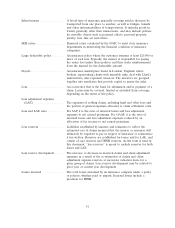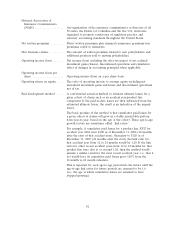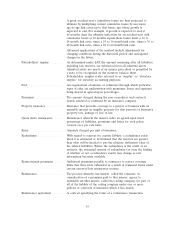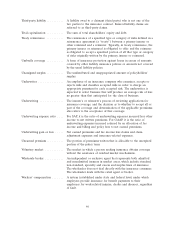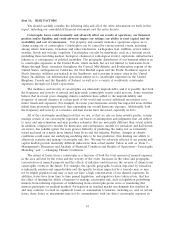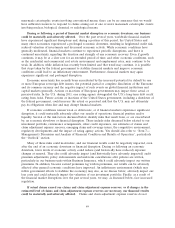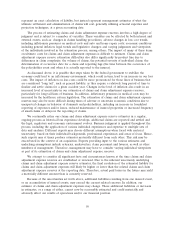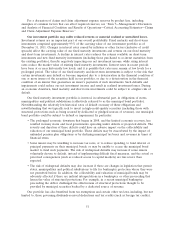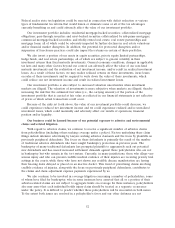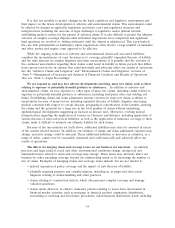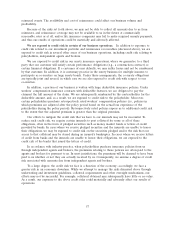Travelers 2011 Annual Report Download - page 61
Download and view the complete annual report
Please find page 61 of the 2011 Travelers annual report below. You can navigate through the pages in the report by either clicking on the pages listed below, or by using the keyword search tool below to find specific information within the annual report.man-made catastrophic events involving conventional means, there can be no assurance that we would
have sufficient resources to respond to claims arising out of one or more man-made catastrophic events
involving nuclear, biological, chemical or radiological means.
During or following a period of financial market disruption or economic downturn, our business
could be materially and adversely affected. Over the past several years, worldwide financial markets
have experienced significant disruptions and, during a portion of this period, the United States and
many other economies experienced a prolonged economic downturn, resulting in heightened credit risk,
reduced valuation of investments and decreased economic activity. While economic conditions have
generally moderated, financial markets continue to experience periodic disruptions, and there is
continued uncertainty regarding the duration and strength of any economic recovery. Even if growth
continues, it may be at a slow rate for an extended period of time, and other economic conditions, such
as the residential and commercial real estate environment and employment rates, may continue to be
weak. In addition, while inflation has recently been limited and that trend may continue, it is possible
that steps taken by the federal government to stabilize financial markets and improve economic
conditions could lead to an inflationary environment. Furthermore, financial markets may again
experience significant and prolonged disruption.
Economic uncertainty has recently been exacerbated by the increased potential for default by one
or more European sovereign debt issuers, the potential partial or complete dissolution of the Eurozone
and its common currency and the negative impact of such events on global financial institutions and
capital markets generally. Actions or inactions of European governments may impact these actual or
perceived risks. In the U.S. during 2011, one rating agency downgraded the U.S.’s long-term debt credit
rating from AAA. Future actions or inactions of the United States government, including a shutdown of
the federal government, could increase the actual or perceived risk that the U.S. may not ultimately
pay its obligations when due and may disrupt financial markets.
If economic conditions remain weak or deteriorate, or if financial markets experience significant
disruption, it could materially adversely affect our results of operations, financial position and/or
liquidity. Several of the risk factors discussed below identify risks that result from, or are exacerbated
by, an economic slowdown or financial disruption. These include risks discussed below related to our
investment portfolio, reinsurance arrangements, other credit exposures, our estimates of claims and
claim adjustment expense reserves, emerging claim and coverage issues, the competitive environment,
regulatory developments and the impact of rating agency actions. You should also refer to ‘‘Item 7—
Management’s Discussion and Analysis of Financial Condition and Results of Operation’’, particularly
the ‘‘Outlook’’ section.
Many of these risks could materialize, and our financial results could be negatively impacted, even
after the end of an economic downturn or financial disruption. During or following an economic
downturn, lower levels of economic activity could reduce (and historically have reduced) exposure
changes at renewal. They also could adversely impact (and historically have adversely impacted) audit
premium adjustments, policy endorsements and mid-term cancellations after policies are written,
particularly in our business units within Business Insurance, which could adversely impact our written
premiums. In addition, because earned premiums lag written premiums, our results can be adversely
affected after general economic conditions have improved. An inflationary environment (which may
follow government efforts to stabilize the economy) may also, as we discuss below, adversely impact our
loss costs and could adversely impact the valuation of our investment portfolio. Finally, as a result of
the financial market disruptions over the past several years, we may, as discussed below, face increased
regulation.
If actual claims exceed our claims and claim adjustment expense reserves, or if changes in the
estimated level of claims and claim adjustment expense reserves are necessary, our financial results
could be materially and adversely affected. Claims and claim adjustment expense reserves do not
49




